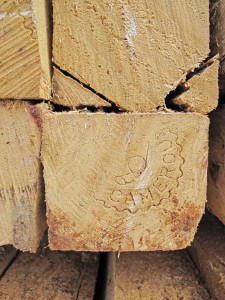Corruption threatens to destroy Cameroon’s domestic timber industry
-----------------
AOUNDE, Cameroon (18 April, 2011)_The trade in illegally harvested timber provides a living for more than 45,000 people, a major source of income for corrupt officials and not a cent for the state. Follow this 5-part series as I explore Cameroon’s hidden harvest.
I have used pseudonyms to protect the identities of some of the people in Cameroon’s domestic timber industry who were interviewed.
It is mid-morning at Montée Parc Market, the largest of the 25 timber markets in Yaoundé. A MINFOF official sits on a large pile of planks, eating sandwiches and casually chatting with some of the merchants. He and two other officials who are doing their rounds are a familiar sight here, as they come every day to take their payments. You can tell which merchants have paid up, as their timber has been stamped with the officials’ hammer.
‘On average, we have to pay around 200 CFA a plank,’ one of the timber merchants explains. ‘If you don’t pay up, they’ll seize your timber. Sometimes, you end up paying twice, because MINFOF’s Brigade Rouge will demand money as well.’
This story is repeated throughout the timber markets in Cameroonian cities. ‘It’s very annoying for us,’ says Etienne Bokagne, president of the merchants’ association in Manguier Market. ‘These informal payments represent a significant business cost at a time when our profits are already declining.’
 |
| Once government officials have received their informal payments, or bribes, they stamp planks with an embossed hammer to provide proof of ‘legality’. Only then can traders shift their timber. |
Profits are declining for two reasons. First, the profitability of the sector has attracted large numbers of individuals, thus increasing competition for timber. The number of depots in Montée Parc Market rose from just seven in 2003 to 260 by 2010; the number in Mimboman Market from 10 in 1997 to 60 today. At the same time, timber has become scarcer in the countryside; you frequently hear of porters having to walk up to five kilometres to the nearest road to get timber out of the forests, rather than just one or two kilometres, as in the past. All of this has pushed up prices. In 1997, merchants in Mimboman Market paid around 75,000 CFA (€115) for a 6-tonne lorry of iroko; now the same amount costs 250,000–300,000 CFA (€380–460), although even with this increase, informal sawnwood remains up to 4 times cheaper than legal, industrial sawnwood.
‘Most of the merchants we’ve interviewed believe that there are now too many people involved in the business and they are particularly concerned about the growing scarcity of the resource,’ Edouard Essiane explains. ‘Mind you, this is still a profitable business and each depot owner will make around 300,000 CFA (€460) a month.’
Cameroon’s 1994 Forest Law divided the forest estate into permanent and non-permanent domains. The permanent forest domain includes land which is allocated for permanent forest use, including sustainable timber harvesting and biodiversity conservation. The non-permanent forest domain includes forests which can be used for other land-use purposes, and this is where most of the small-scale chainsaw milling now takes place. However, Cerutti believes that the growing scarcity of timber makes it increasingly likely that chainsaw millers will seek to source timber in the permanent forest domain. Indeed, that is already beginning to happen in some areas.
‘At the moment, the main problem we face in terms of protecting our concessions comes from commercial poaching,’ explains Pierre Bertieaux, who manages SFID’s operations at Mbang. ‘However, there is also a problem with chainsaw millers operating inside our concessions, especially in areas close to villages.’ A six-man team is responsible for controlling illegal activities, but it can take a whole day to travel from one end of the concession to another and catching illegal chainsaw millers and poachers is far from easy. In any case, says the head of the control team, Amadou Ahidjo Akamba, MINFOF staff show little enthusiasm when they do receive reports of illegal logging.
‘I think the problem is getting worse,’ he says. ‘And it’s not just high-value trees like ebony they are targeting, but other species too.”
---------------

